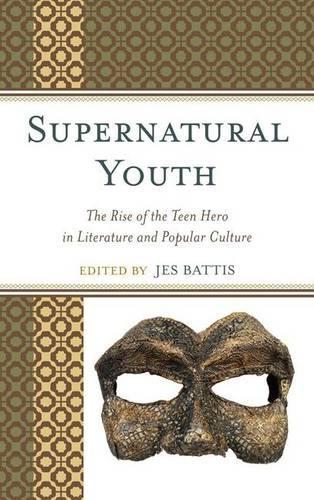
Supernatural Youth: The Rise of the Teen Hero in Literature and Popular Culture
(Paperback)
Publishing Details
Supernatural Youth: The Rise of the Teen Hero in Literature and Popular Culture
By (Author) Jes Battis
Contributions by Michael Cisco
Contributions by Alison Ching
Contributions by Cary Elza
Contributions by Gideon Haberkorn
Contributions by David Kociemba
Contributions by Alice Mills
Contributions by Jennifer Moorman
Contributions by R.C Neighbors
Contributions by Verena Reinhardt
Bloomsbury Publishing PLC
Lexington Books
15th August 2013
United States
Classifications
Tertiary Education
Non Fiction
Popular culture
Films, cinema
Television
Folklore studies / Study of myth
306.4
Physical Properties
Paperback
256
Width 152mm, Height 230mm, Spine 17mm
358g
Description
Supernatural Youth: The Rise of the Teen Hero in Literature and Popular Culture, edited by Jes Battis, addresses the role of adolescence in fantastic media, adventure stories, cinema, and television aimed at youth. The goal of this volume is to analyze the ways in which young heroic protagonists are presented in such popular literary and visual texts. Supernatural Youth surveys a variety of sources whose young protagonists are placed in heroic positions, whether by magic, technology, prophecy, or other forces beyond their control. Series examined include Harry Potter, Buffy the Vampire Slayer, Veronica Mars, and Sabrina the Teenage Witch.
Supernatural Youth, edited by Jes Battis, is essential for educators who work in the fields of English, media studies, women's studies, LGBT studies, and sociology, as well as undergraduate students who are interested in popular culture.
Reviews
Supernatural Youth is truly a unique collection. In over a dozen essays written, appropriately, by engaged young scholars, this readable, provocative, and comprehensive book offers a multifaceted, many-voiced, multi-media consideration of the young hero/heroine. It will add years to its readers sophistication while making their imaginations young again. David Lavery, founding editor of Slayage: The Journal of the Whedon Studies Association
Jes Battis has gathered a lively set of essays on a subject of serious significancethe deeply needed fantasy stories of embattled and marginalized youth. From Gideon Haberkorn and Verena Reinhardts aphoristic appreciation of novelist Terry Pratchett to David Kociembas defense of the extraordinary ordinariness of Buffys Xander; from Alison Chings analysis of the archetypes of Holly Bushs urban fantasy to Hugh Daviss tour of the allusions of Hex, these essays provide a vivid picture of the kind of hero that lives at the heart of the best current YA fantasy. Perhaps most important of all, each contributor, in a different way, focuses on the ethics underlying these stories of what Battis calls queer and questioning teens. Rhonda V. Wilcox, Gordon College
To quote Tamora Pierce, the author of The Song of the Lioness and several other young adult novels, fantasy is a 'literature of empowerment.' This aphorism takes on new meaning in light of the many provocative observations put forth in Supernatural Youth: The Rise of the Teen Hero in Literature and Popular Culture. Bringing together thirteen original essays that transport the reader from the outer edges of Terry Pratchetts Discworld to the hallowed halls of Hogwarts and beyond, this energetic collection will doubtless spark a reassessment of our most treasured cinematic, literary, and televisual texts (including Ursula K. Le Guins Earthsea volumes, Neil Gaimans comic book series The Books of Magic, and Joss Whedons cult sensation Buffy the Vampire Slayer). But this books greatest contribution is its thoroughgoing exploration of the ways in which an 'intangible, ethical magic' (to borrow the words of Jes Battis) at the heart of these and other less widely discussed texts (such as the TV series Hex and Sabrina the Teenage Witch) informs the construction of gender, sexuality, and adolescent identity among social outcasts. Like Pierces allegorical tales involving cross-dressing and lesbianism, Supernatural Youth challenges us 'to see beyond the concrete universe and to envision other ways of living and alternative mindsets' an invitation that can empower readers young and old alike. David Scott Diffrient, Colorado State University
Author Bio
Jes Battis is assistant professor of English at the University of Regina, Saskatchewan. He is also the editor of Homofiles: Theory, Sexuality, and Graduate Studies (Lexington Books, 2011).
